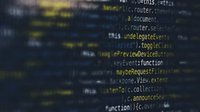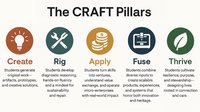In this presentation, Learning Counsel CEO LeiLani Cauthen and special guest Felicia Rattray, Founder of the Permission to Succeed Education Center, explain the real-world benefits of Hybrid Logistics in our post-pandemic universe.
According to Cauthen, “Its “Why” is really, how do you create equity through study time adjustment? One of the districts you heard from today, Meriden, has transformed learning with how much time they block into math. So, they've done it within a traditional sort of master schedule, but they're playing with time and we're starting to see this more and more. So that's what started coming up during the pandemic. And then, how do you create personalization by customization? Which is what SAFARI was just talking about. How do you tweak on the fly, and really cause intersection with human teaching so that it's very precise. Like this kid's obviously in a loop over here and needs some fixing. So, freeing up teachers to do more direct instruction roaming.
“How do we Change this 200-year-old manufacturing model,” said Cauthen, “which moves students along the manufacturing line by age? It doesn't work really for a lot of kids. And what ends up happening is that it demoralizes teachers who say to themselves, ‘I need to shut off the fact that I just failed these three kids to save these other ones. Because I have to focus on the group, not the individual. So how do we really focus on the individual? Those were the kinds of questions that came up because a big, bright light was shined on everyone during the pandemic.”
When Rattray was preparing to start her school, she did not believe she could find what she was searching for. That was before she discovered The Hybrid Logistics Project. “I wasn't sure if what I was looking for even existed,” said Rattray. “I had a vision of every student being able to get the help that he or she needed in the moment, on demand, right then and there. It seemed unrealistic, but I still had that dream, because I started my school with the concept of trying to find help for my nephew who is on the spectrum. And he needed the public school system to slow down long enough for him to get it. And as you said, the pandemic shined a big light on what wasn't happening. We had good intentions in the school system, but it just wasn't working. So, I was hoping to find an environment for my nephew and all other students like him. I struggled because for the first two years of having my school open, I didn't see a system like that. And I was up all night, looking at reports, me and my one team of one staffer other than me. We were constantly looking at different reports because we were doing different, we were using different platforms. We wanted to individualize that experience. I started off with five students, then it grew to 10, then it went to 15, and now it's 40. And so if it had not been for me finding you, my experience would have probably made me crazy the way I was doing it, because each child had a different curriculum because what worked for one child didn't work for another.”
To make a long story a wee bit shorter, Rattray was exposed to a room-sized game that Cauthen created for use at the Learning Counsel’s Digital Transition events.
“Then we played this game,” said Cauthen. “We invented a game where we said, let's throw out the old structure and let's see what would happen to have every kid on their own individual path. So that they were all in a homeroom. And maybe you have four or five homerooms on your campus, because you got a lot of ages and a lot of kids. But you have a study base. There's a base room where everybody goes, this is not unlike homeroom or study hall in some places. But then they're flighted out for meeting style events, that are the classes. Or classroom time, or maybe they're long like a whole lab where you gotta get dirty and do stuff. Or maybe they're short. Or maybe the teacher comes swooping in because they're seen on their dashboard, something's going on with you and they pull you aside to a little meeting space in the main room, fix whatever's going on with you and then swoop back out and do more customizations until their next meeting. People were excited about this. So, the Learning Council started implementing it as a test, then production, then capacity in Knowstory.com.”
And the very thing that Rattray was looking for, the thing she thought she could never find, was born and became known as the Hybrid Logistics project.
“The Knowstory platform basically is a one, stop shop, or platform for me,” said Rattray. “I know I'm different in the sense that I'm a micro private school and so I don't have all the resources that a lot of big schools have. However, Knowstory allows me to be able to put the platforms that I am using into Knowstory, schedule it all out, have it already there, planned out, and its adaptable. So, it makes me feel like a big fish, even though right now I'm micro. It's just a game changer. I can't say it enough and I can see how it can definitely be used in the public school systems if they can just create a lot of little homerooms to make this work for them.”
“It's definitely a game changer, said Cauthen. “I see them all moving in the direction of trying to be more flexible with time, but they hit a wall, which is their traditional block schedule. And if you can't stick with the block schedule, then you have to go over there with the online kids. The blending between the two rails is not really fluid, right? But we don't live in a two-rail world anymore. So, this is what this technology was attempting to confront. How do you still create intersection with humanity without making everything go online?”
The Hybrid Logistics Project proposes educational transformation through changing the grade-and-class structure to a hybrid model of time and space use, characterized as learning “uberization.” Since teachers are not always tied to a classroom, they can roam to help individual students but still have live human teaching moments to lecture, hold discussions, and do hands-on projects. Schools do not need to change every part of their current structure but can use a Hybrid Logistics Infrastructure to personalize learning paths during study hall time for subjects like electives and remedial learning. A Hybrid Logistics Infrastructure does not make all learning online or remote. It is the long-desired middle ground between online and on-campus.
Don’t miss a moment of this informative video, and see how Hybrid Logistics can give your school or district a greater command of space and time, and deliver true, personalized learning paths for your students.











